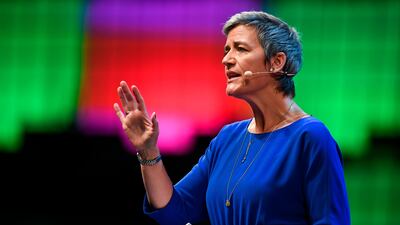She strikes fear into the hearts of many in the tech world, but Margrethe Vestager is quick to laugh and habitually cracks jokes throughout her speeches and press briefings.
“It only hurts when you’re looking at the picture,” she quipped as she tried to cajole a room of journalists into smiling as she took a photo of the group for her Twitter account.
The inspiration behind the hero character in Danish political drama, Borgen, Mrs Vestager juggles a family and powerful career. Entering politics at the age of 21, the 49-year-old has three daughters and has spent the last few years holding the tech powerhouses of Google and Apple to account as the European Commissioner for Competition.
The guardian of competitive business in Europe, the Dane has likely made enemies of some of the most powerful men in the world.
Dishing out a €2.4bn fine to Google in June for manipulating search results and taking a case to the European Court of Justice to attempt to force Ireland to collect €13bn in taxes owed by Apple, Mrs Vestager is often criticsed for being anti-American and anti-business.
Today, speaking at Web Summit, one of the biggest tech events of the year, it was clear name-calling was not going to frighten her off.
Mrs Vestager accuses big companies of suffocating smaller companies out of the market and as a result holding innovation back.
“[Competition] makes us learn, it makes us do something that we didn’t imagine we could do beforehand. That means that it is a problem when powerful companies which dominate the market decide to use their power to close down competition and that can also end up closing the door to innovation.
“This is why dominant companies like Google have a special responsibility. A special responsibility not to undermine competition because you’re dominant but because you hold all these powers,” she explains.
With a slight smile, the elegantly tall Dane named and shamed, as a mother would do with a naughty child: “We had to give Google a fine because it didn’t live up to this special responsibility”.
In its early days Google had the chance to compete and grow, but, Mrs Vestager says, the internet giant was refusing others the same opportunity.
“We cannot accept when Google uses the power of its search engine to deny others the chance to compete,” she says.
__________
Read more
UAE right to put AI on the political agenda, says European Commissioner for Innovation
Stephen Hawking: AI could be 'worst event in the history of our civilisation'
Big tech companies threaten our democracy, warns EU Commissioner Margrethe Vestager
__________
The goal of levying such dramatic fines, she hopes, is to keep the market open and competitive. Mrs Vestager and her team also monitor mergers and how companies hoard big data.
“That doesn’t mean we are suspicious of big data in itelf. Of course not. Big data holds enormous potential. It can make us do wonderful things… but controlling large amounts of data shouldn’t be a way of shutting out your competitors,” she says.
Last year Mrs Verstager and her team examined the Microsoft purchase of LinkedIn.
“We wanted to know if combining the data of those two companies together would make it too hard for anyone else to compete,” she explains. In the end, they found it was not the case and Microsoft bought the business networking site for $26.2bn.
The next target of her fierce diatribe was — unusually for a European Commissioner — governments.
“When a government gives a special, selective tax treatment to just a few companies, selective treatment which is not available to the huge majority of businesses who just pay their taxes. That makes it more difficult to compete.” she explained.
The European Commission for Competition is cracking down on government sweetheart deals as a result - not just to encourage competition but also to ensure all taxes that should be paid are. An international agreement on how to tax the digital economy is on course to be completed by next May.
Apple’s sweetheart deal with Ireland is one of the deals that has been in Mrs Vestager’s crosshairs.
Apple was ordered to pay a record-breaking €13bn in back taxes to Ireland after the European commission ruled that the tax deal between Apple and the Irish tax authorities was illegal under EU state aid rules.
The commission said the deal allowed Apple to pay a maximum tax rate of just 1%. In 2014, the tech firm paid tax at just 0.005%, compares to Ireland’s normal 12.5% of corporation tax.
“I have been asking for an update on the arrangement made by Apple, the recent way they have been organised, in order to get the feeling whether or not this is in accordance with our European rules but that remains to be seen,” Mrs Vestager told a news briefing in Lisbon.
“We are looking into this of course without any kind of prejudice, just to get the information,” she said, and clarified that this action preceded reports based on the Paradise Papers which showed that Apple shifted key parts of its business to Jersey as an offshore tax haven in a move to maintain a low tax rate. Apple has said no operations were moved from Ireland.

